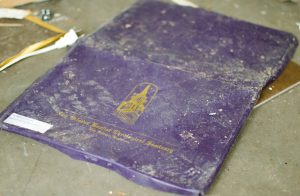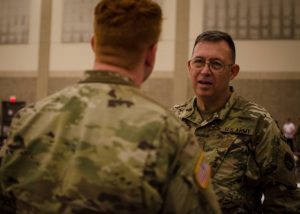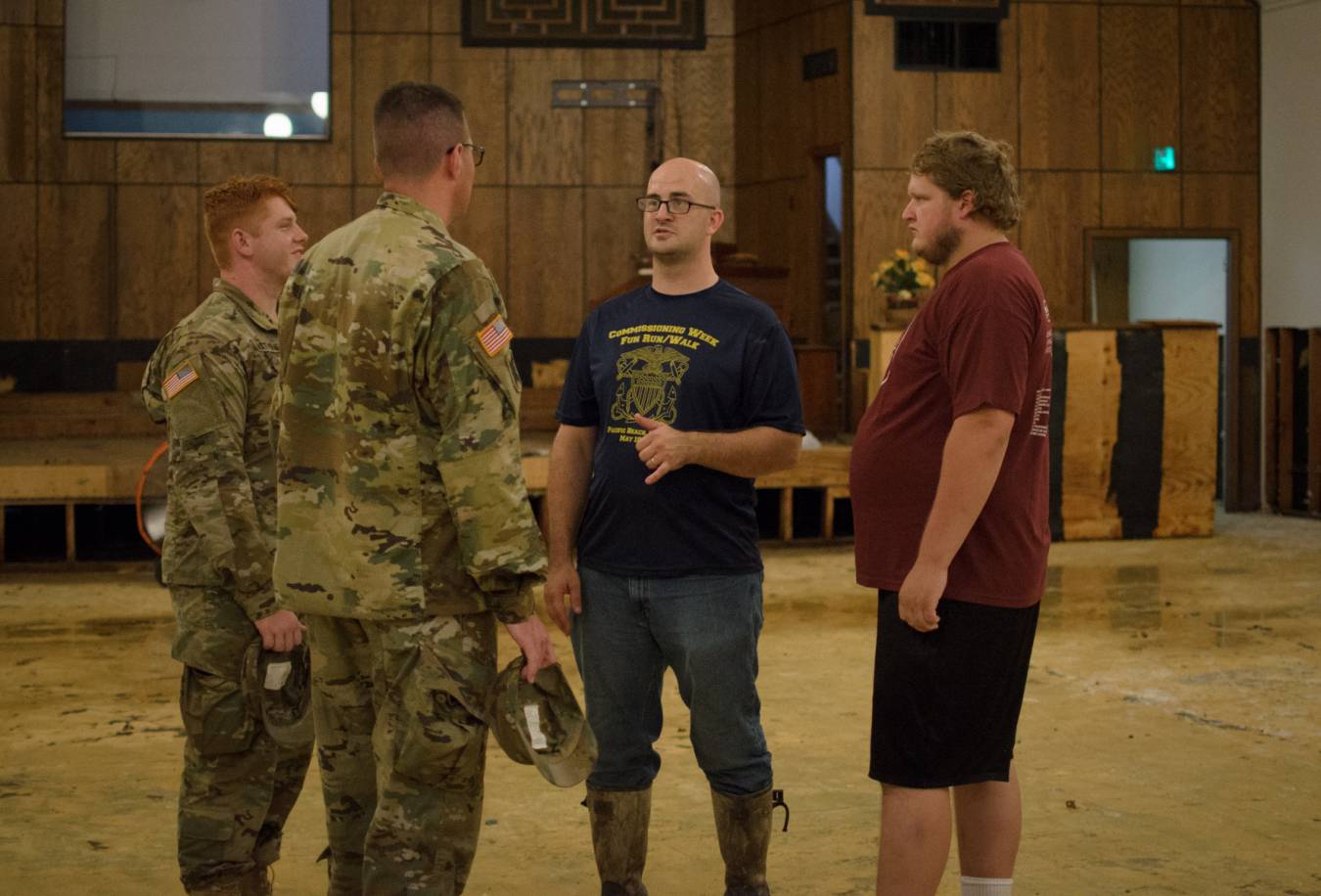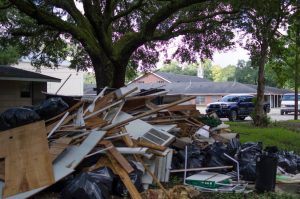My Marilyn Stewart, NOBTS public relations
BATON ROUGE, La. — For Southern Baptist chaplains serving with the Louisiana National Guard, the historic August flooding that widely impacted the state was different from anything they had seen before and at the same time, all too familiar.
Brigade Chaplain Page Brooks, of the 256th Infantry Brigade Combat Team and New Orleans Baptist Theological Seminary faculty member, said that even though the water did not come from a named storm, the devastation was much the same.
“This reminds me of other natural disasters, the sense of loss, of panic, and hurt that Louisianans have experienced before,” Brooks said. “There’s just such surprise.”
Upwards of 31 inches fell in a day’s time in the hardest hit areas of Livingston Parish, according to an Aug. 16 National Oceanic and Atmospheric Administration report.
Brooks said some evacuees reported having less than three hours to prepare or had been out of town as the water came in. Some lived in places that had never before flooded, he added.
National Guard chaplains care for the caregivers and first responders who plucked people out of raging water and rescued people off rooftops. Of the chaplains led by Major Brooks from Jackson Barracks in New Orleans, one Southern Baptist chaplain was not activated—Chaplain Thomas Fletcher, the pastor of Faith Baptist Church, Baker, La., and NOBTS alumnus, whose home and church flooded.
“It’s brutal. It’s absolutely devastating,” Fletcher recounted of the flooding that invaded the homes of about half of his church members. He concluded with a plea, “Pray for me.”
Piles of debris from the flood-damaged parsonage at Faith Baptist Church in Baker await removal. Marilyn Stewart photo
HUDDLED TOGETHER
Fletcher watched from the second story of the church educational building as the water rose inside the parsonage and the worship center. As he watched, a boat dropped off a senior adult neighbor, a disabled woman from Brazil, and her daughter at the church. Before the water crested, the group at the church had swelled to ten.
The last few years had been difficult for the church, Fletcher said, explaining that a financial crisis had drained the congregation’s resources emotionally and materially, forcing the church to forego flood insurance and put off needed structural changes to the physical plant.
“We were in a rebuilding process already,” Fletcher said.
With mounds of debris continuing to grow in front of each home on the street, Fletcher noted the magnitude of the task ahead.
“It’s a big problem,” Fletcher said. “We’ve got a big God.”

Thomas Fletcher’s ruined diploma lies in the flood-damaged parsonage at Faith Baptist Church in Baker. Marilyn Stewart photo
WEATHERING THE STORM
“How are you doing?” Chaplain Phil Smith, NOBTS alumnus, asked as he made his rounds at the evacuee shelter, the River Center of Baton Rouge, speaking to soldiers and airmen at work. Smith’s first responsibility is to soldiers and airmen who serve others often at the cost of time away from career and family.
His job, Smith said, is to help servicemen and women remain resilient.
Using Scripture such as Jeremiah 31:3, Hebrews 13:5-6, and Romans 8:28 Smith reminds those in his charge that God loves them and keeps His promises, a method he said crosses all belief systems and denominations, particularly in crisis situations.
Smith pointed to hurts and disappointments in his own life that he did not understand at the time, but that God used later to bless him and to prepare him for his job as a chaplain.
“In my own life, when God took away good things, I found out He was making room for the best things,” Smith said.

Chaplain Phil Smith talks with Richard Watkins, chaplain’s assistant, at Faith Baptist Church in Baker.
A PATH TO HOPE
Helping those caught in a crisis situation requires an approach tempered with wisdom and patience, chaplains report.
Rather than saying “it’s only things” or “at least you are safe” to those impacted by flooding or other disasters, Smith advised using questions, such as “Is your spouse safe? Are your children safe?” to help victims keep things in perspective and find their way to hope.
Brooks cautioned that those in a crisis situation may “relive” past disasters or that unresolved heartache may resurface when a new crisis arises.
“This may bring up past loss,” Brooks said. “People may cycle through grief and loss again and they will need to be given the space and time to do that.”
Brooks praised the relief effort, noting that the operation has run smoothly and that communities, families, and churches across Louisiana have come together to help.
“Everyone needs a sense of hope,” Brooks said. “This is where the church comes in with the Gospel, with chaplains, with people caring for one another. The small acts of taking food or helping someone in their home, praying with someone, those small acts provide little glimpses of hope along the way in the process of recovery.”





